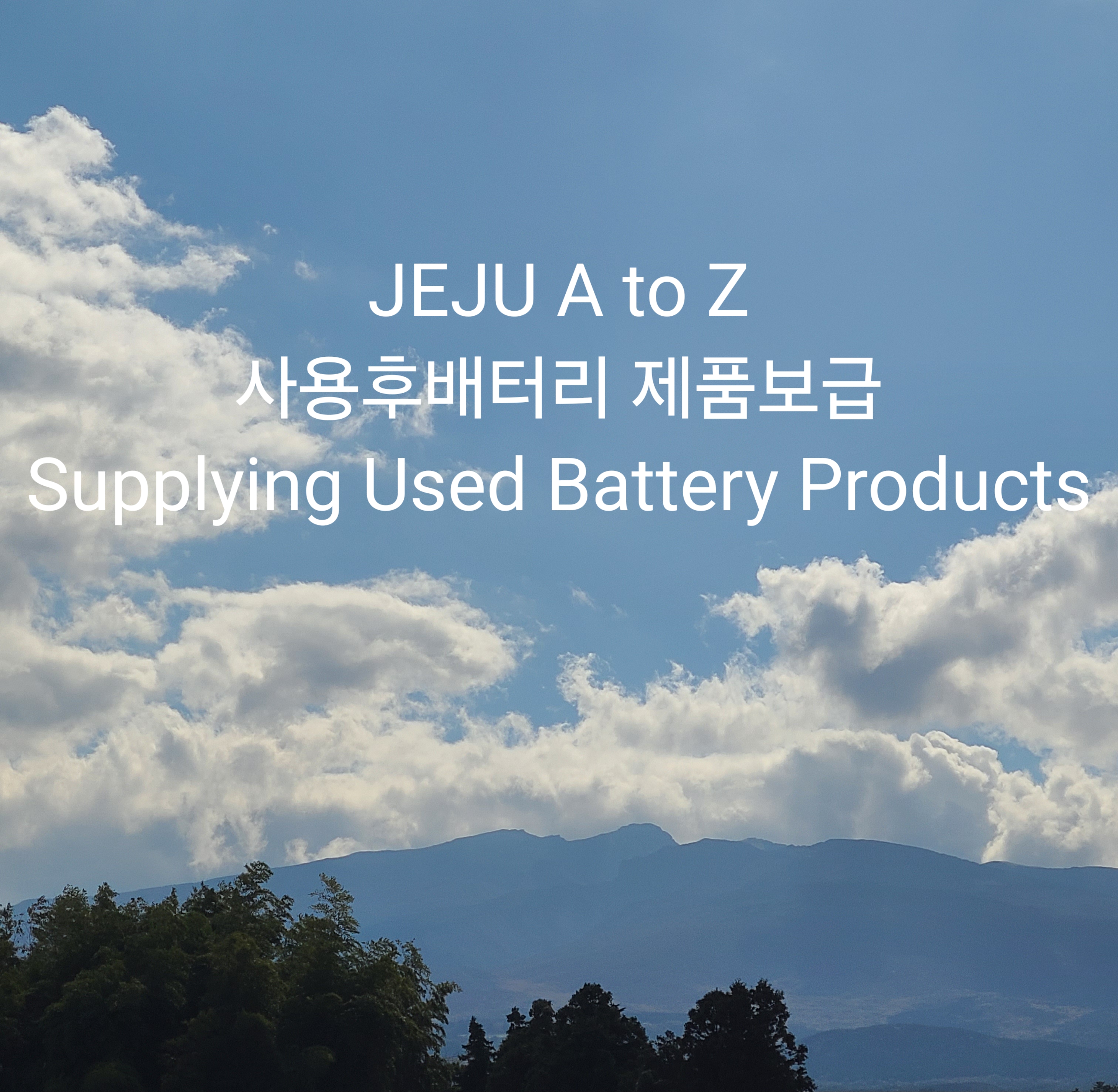JEJU A to Z
사용후배터리 활용제품 보급추진
Supplying Used Battery Products

Z: 제주는 전국에서 가장 높은 전기차 보급률을 바탕으로 사용후 배터리 활용방안에 고심이다.
제주도청과 환경부 그리고 제주테크노파크가 함께 전기차 사용후 배터리 활용제품을 보급하는 시범사업을 추진한다.
Jeju is considering how to utilize spent batteries based on the highest penetration rate of electric vehicles in the country.
The Jeju Provincial Government, the Ministry of Environment, and Jeju Techno Park will work together to promote a pilot project to distribute products using batteries after using electric vehicles.
A: 전기차 부품의 가장 중요한 부분을 차지하는 것은 폐배터리이다.
사용후 배터리를 활용할 수 있다면 자원순환의 좋은 모델이 될 것이다.
Waste batteries are the most important parts of electric car parts.
It would be a good model for resource circulation if batteries can be utilized after use.
Z: 사용후 배터리 활용제품 보급사업은 연구와 시험을 마쳤다.
이제 전기차 사용후 배터리 활용제품 상용화에 돌입하는 단계에 접어들고 있다.
The project to supply spent battery products has been researched and tested. Now, it is entering the stage of commercialization of battery-powered products after using electric vehicles.
A: 어떤 활용제품들이 있나요? What products does it use?
Z: 대부분 농업에 활용된다. 농작물 운송장비에 활용하게 되는데 이동형과 고정형 모델들이 있다. 전국 최초 사례가 될 것이다.
It is mostly used in agriculture. It is used in crop transportation equipment, and there are mobile and fixed models. It will be the first case in the country.
A: 상용화 단계라고 했는데 이제 제품생산은 얼마나 될 예정인가요?
It's in the commercialization stage, how long are you planning to produce those product now?
Z: 환경부가 참여하는 국가사업으로 총사업비 48억원이 투입된다.
그리고 향후 3년간 진행될 사업이다.
이를 수행하는 기관은 제주테크노파크이다.
JTP는 연간 100대씩 3년간 총300대의 농작물 운송장비를 보급할 예정이다.
The total project cost of 4.8 billion won will be invested as a national project involving the Ministry of Environment.
And it is a project that will run for the next three years.
The institution that carries out this is Jeju Techno Park.
JTP plans to supply a total of 300 crop transport equipment over three years, 100 per year.
A: 고정형 모델은 어떤 제품이 될까요? What kind of product will the fixed model be?
Z: 공동시설형 및 보급형 에너지저장장치에 활용하게 된다.
그리고 2k 와트급 태양광과 연계한 독립형 가로등 ESS가 보급될 예정이다.
이동형모델은 3k와트급 농기구와 5킬로와트급 자율형 이송 로봇에 활요오딘다.
It will be used for joint facilities and entry-level energy storage devices.
In addition, a standalone streetlight ESS linked to 2k watt-class solar power will be distributed.
The mobile model is active on a 3k-watt farming tool and a 5k-watt autonomous transport robot.
A: 농업분야에 있어서 작업 효율성이 올라가겠네요.
스마트 농업기반을 구축하는 계기도 되고요.
Work efficiency will increase in the agricultural sector.
It is also an opportunity to build a smart agricultural foundation.
Z: 이 제품들은 에너지 취약지역 전력 공급 안정화에도 큰 도움을 줄 것으로 보인다.
그리고 전력 피크타임 전력수요관리에도 큰 도움이 될 것이다.
제주도청은 사용후 배터리의 재사용 연구와 제품개발, 현장실증을 진행한 후 성능과 안전성, 활용가능성에 대한 데이터를 확보하고 이를 바탕으로 보급을 추진한다.
These products are expected to greatly help stabilize the power supply in energy-vulnerable areas.
And it will be of great help to manage power demand at peak time.
After researching the reuse of spent batteries, developing products, and conducting on-site demonstrations, the Jeju Provincial Government secures data on performance, safety, and availability and promotes distribution based on this.
A:이제 제주는 폐배터리를 활용할 수 있으니 자원순환 경제모델을 만들어나갈 수 있을 것이다.
Jeju can now use waste batteries, so we will be able to create an economic model for resource circulation.
Z: 전기차 사용후 배터리의 잔존가치를 활용한 자원 선순환체계를 구축할 수 잇을 것이다.
전기차 배터리를 재사용해서 농촌과 에너지 취약지구 등에 제품을 보급하는 것은 지속가능한 미래로 가는 중요한 전환점이 될 것이다.
It will be possible to establish a virtuous cycle system of resources that utilizes the residual value of batteries after using electric vehicles.
Reusing electric vehicle batteries to distribute products to rural areas and energy-vulnerable districts will be an important turning point for a sustainable future.
A: 자원선순환기반의 산업생태계를 구축해 나가는 제주의 미래를 기대해본다.
I look forward to the future of Jeju, which will build an industrial ecosystem based on resource circulation.